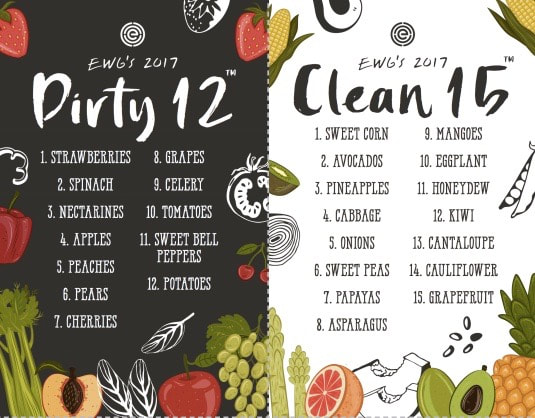BLOG |
Maybe you’ve seen these weird things around. They look like carrots but they’re purple or yellow or magenta, sometimes even almost black. To some, they can be a little off-putting—unknown vegetables make a lot of people uncomfortable, even grown-ups. Well, consider this your introduction to heirloom carrots.
Aaah! The season of delicious and fresh Okanagan fruits and veggies is in full swing! I love all the fresh produce the summer in the Okanagan delivers! With all the extra fruits and veggies at arm's reach, it is important to remember our non-friend: pesticides, which are a major health concern! Eating organic can help! It can also be pricey!
Here are the foods with the highest and lowest pesticide load, as published by the Environmental Working Group. For foods on the Dirty Dozen list, choose organic if possible. This is a great place to start! Foods on the Clean Fifteen list do not need to be organic. You can download your own printable version of the guide at their website: www.ewg.org Eating clean feels good! Enjoy! Today it is incredibly common for people to struggle with food allergies, food intolerances, or both. A food allergy presents as an immediate reaction (called "IgE" reaction) upon inhaling or ingesting a food. Consider the classic peanut allergy in which an individual eats a peanut and moments later experiences symptoms like runny nose, skin reactions like hives, redness, or swelling, itching or tingling in or around the mouth and throat, digestive problems such as diarrhea, stomach cramps, nausea or vomiting, tightening of the throat, and shortness of breath or wheezing. These kinds of allergies can be life-threatening and are commonly diagnosed based on presentation alone or through a skin scratch test performed by an allergist.
A food intolerance (also known as a food sensitivity or IgG response) is a different beast entirely! People with food intolerances may not notice symptoms until hours to days after ingesting a given food, and the symptoms can be vague and varied in nature. Common food sensitivities include dairy, eggs, wheat, and soy. Generally speaking, food intolerances are not usually life-threatening, but they can be a cause of chronic inflammation and lead to numerous symptoms including brain fog, fatigue, chronic ear infections, tonsil and adenoid enlargement, eczema and acne symptoms, digestive complaints including constipation, diarrhea, heartburn, abdominal pain, gas and bloating, as well as migraines, runny nose, joint pain, and respiratory problems. The skin scratch allergy (IgE) test does not detect for food intolerance. Fortunately, naturopathic doctors are here to help! What's more valuable to you: your car or you? One of the observations I have made since moving back to Canada is that Canadians do not want to pay for healthcare. We contribute to our Medical Services Plan and we believe that our "free" healthcare system should be all we need. And for some, it is. However, many Canadians are still struggling with health issues, despite having a family doctor and access to low-cost or "free" lab testing and imaging. This has me thinking about one of the six guiding principles in naturopathic medicine: praevenire, or prevention. It is such a simple word and yet its power is immense. Even as a naturopathic doctor, I often gloss over this word. What does it mean to practice prevention and why do so few of us do it? Why do so many of us have difficulty investing in ourselves?
|
Archives
December 2020
Categories
All
|




 RSS Feed
RSS Feed